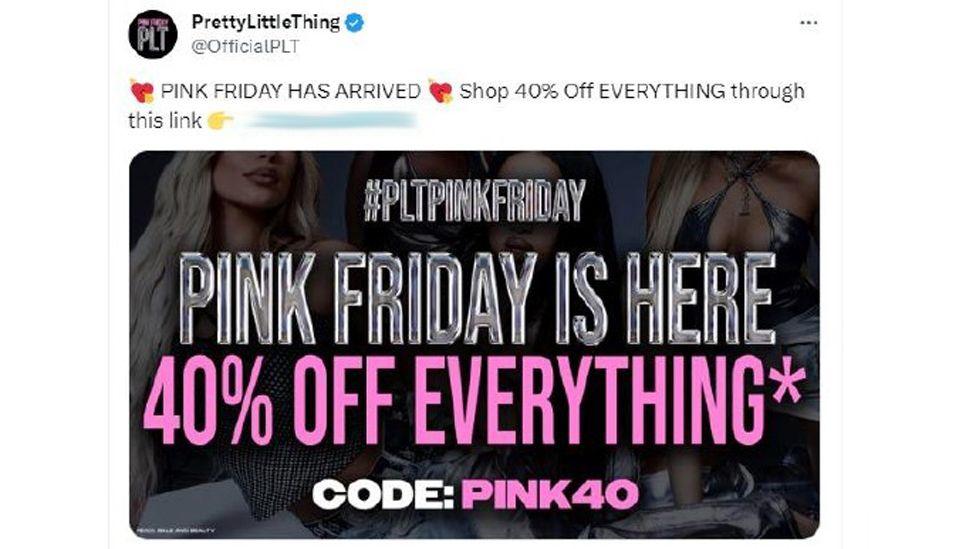Pretty Little Thing warned over 'misleading' ads

The ASA said this type of advert must never appear again
- Published
A fashion company has been reprimanded for the eighth time in four years for breaching advertising rules.
The Advertising Standards Authority (ASA) found Manchester-based Pretty Little Thing ran a number of "misleading" ads during a Black Friday social media campaign between 23 and 28 November.
ASA has upheld seven previous complaints about the company's advertising campaigns since 2020.
Pretty Little Thing said their advertising and marketing was "reflective of what their customers wanted and expected".
ASA investigated 15 posts, external made in November on the social-media site X, formerly known as Twitter, involving a series of offers with discounts ranging from 30-99%.
The special offers had varying deadlines or no deadlines at all and did not always specify if certain products were excluded from the promotions.
ASA upheld complaints relating to three issues.
Firstly, some ads "misleadingly implied the promotion applied to all products", it said, when in fact some products were excluded from the discounts.
Secondly, other ads breached its code of conduct with, "the absence of closing dates from ads, and the inclusion of closing dates from ads when promotional periods were shortened or extended".
'Misleading discounts'
Thirdly, ASA said: "The ads misleadingly implied that further discounts would not be available when the promotion ended" but found that more discounts were later promoted online.
ASA said it had told Pretty Little Thing that their ads should "not state or imply that a promotion included all product lines" if that was not the case.
The authority also said the fashion company must ensure that future ads state significant conditions to promotions, and that qualifications were presented clearly.
"We told them to ensure their ads did not mislead as to the closing date/time of promotions, or imply that discount offers were time-limited or would not be repeated if that was not the case," it added.
In a response, Pretty Little Thing said their customers "were value-oriented and their advertising and marketing was reflective of what their customers wanted and expected".
They said they "always tried to include significant conditions to promotions in ads, but sometimes space was limited" and included information "such as end dates and an asterisk with qualifying information where possible".
Detailed further terms and conditions were on their website, which customers could review ahead of any purchase, it added.
Listen to the best of BBC Radio Manchester on Sounds and follow BBC Manchester on Facebook, external, X, external and Instagram, external. You can also send story ideas to northwest.newsonline@bbc.co.uk, external
Related topics
More like this story
- Published13 July 2022

- Published7 April 2021
